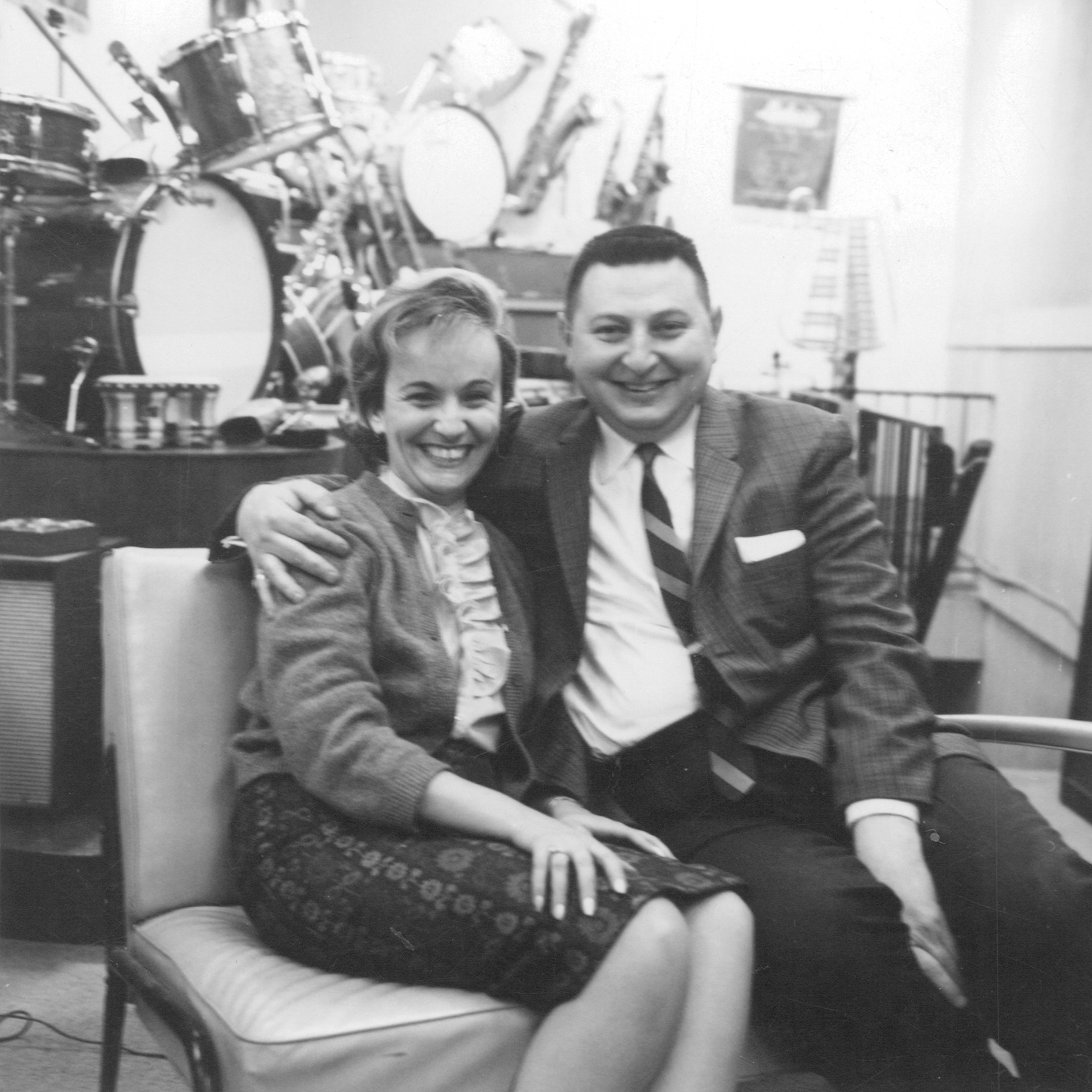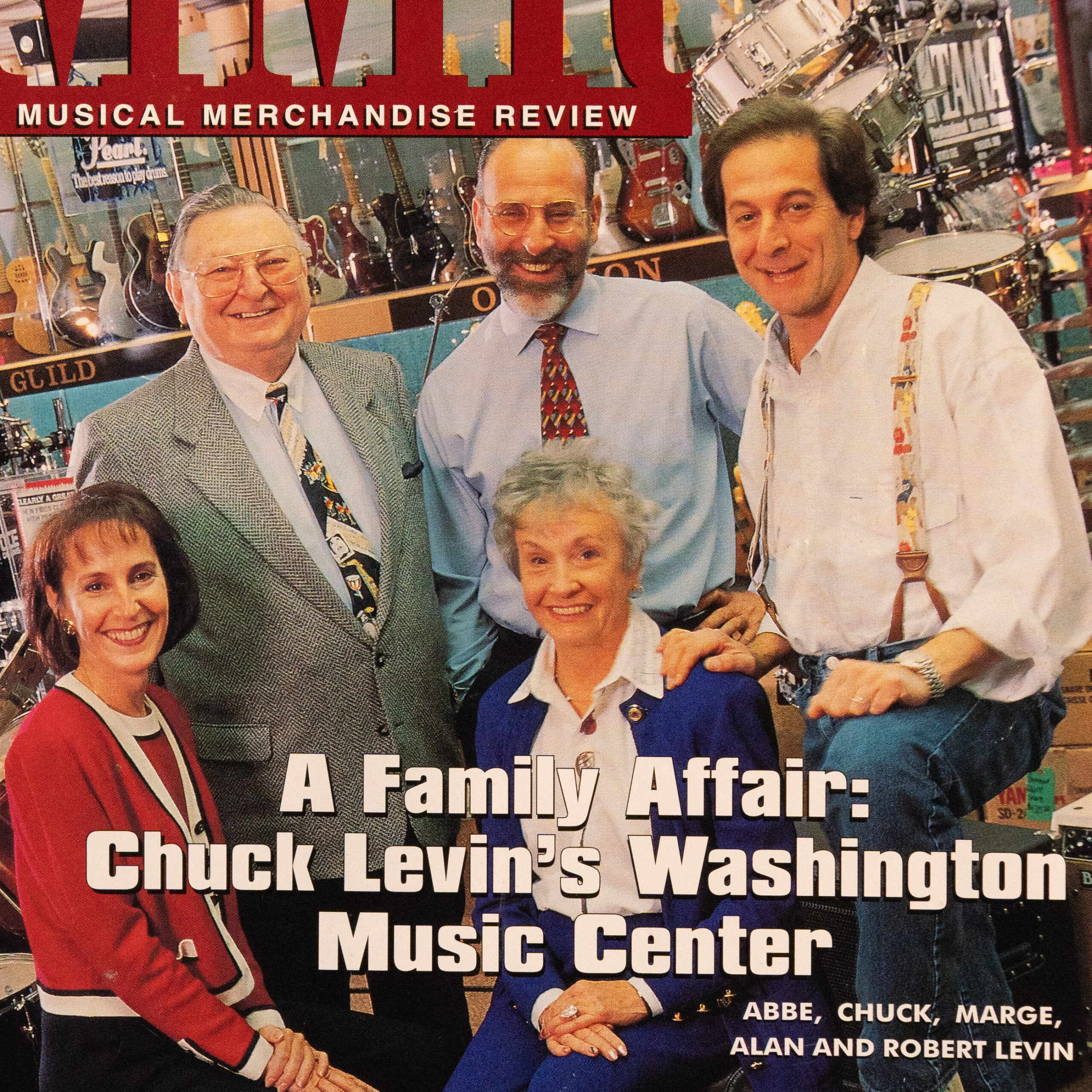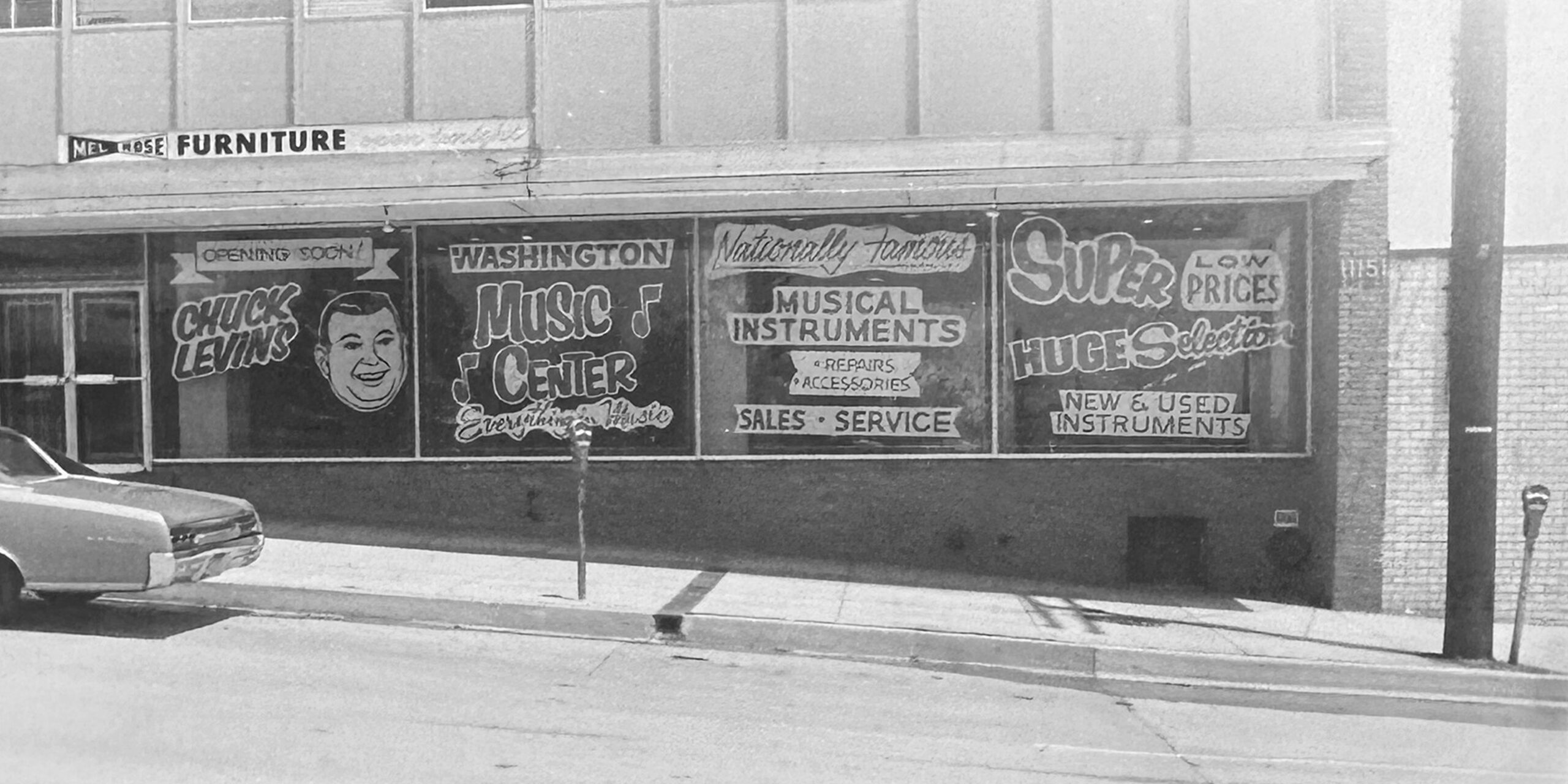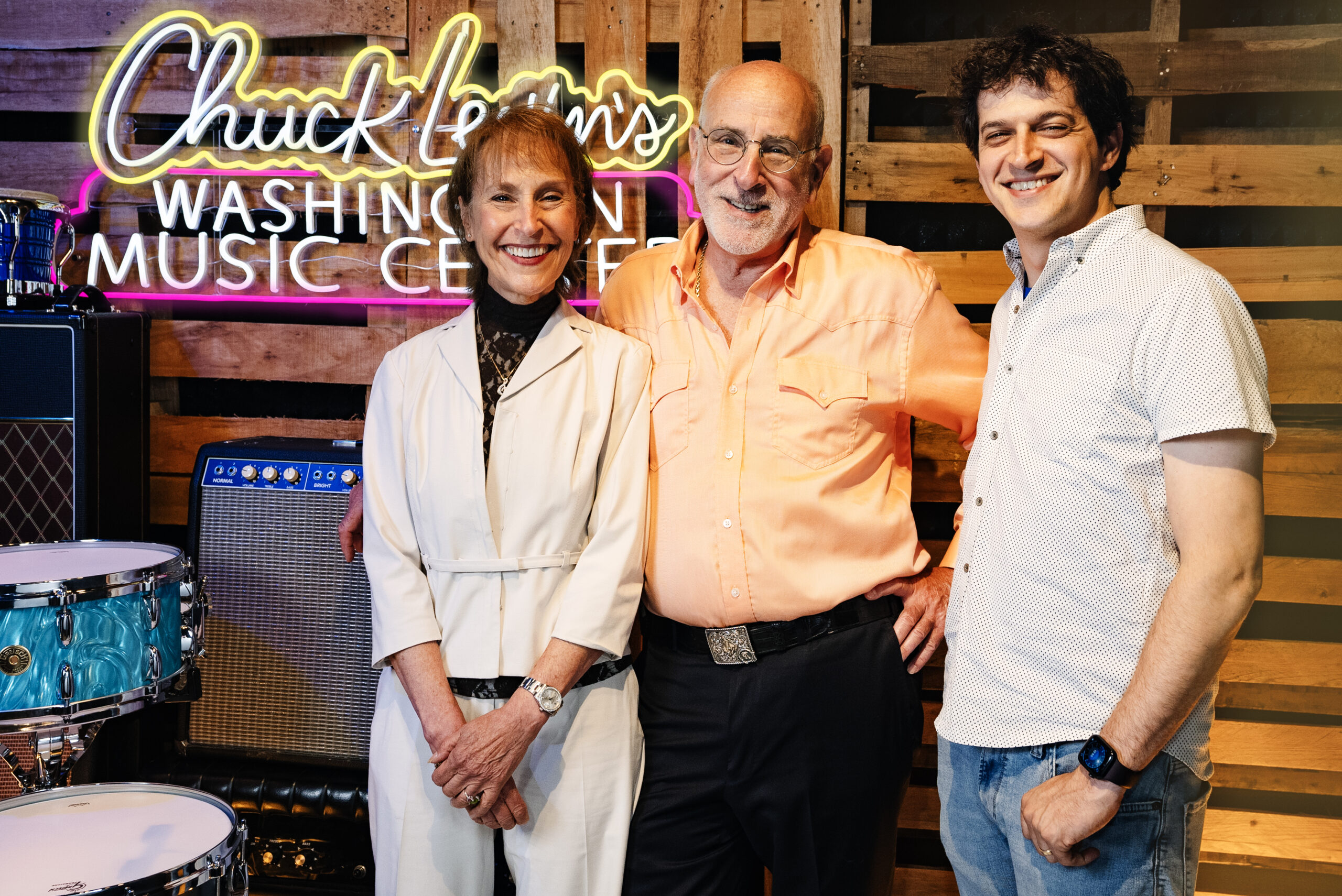Chuck Levin’s Washington Music Center, “Everything in Music Since 1958:” A Family Music Business Tribute
Two generations of family reflect on their recipe for 65 years of success (and how they plan on being around for another 65).
By Ron Denny, Gretsch Contributor.
With Fred and Dinah Gretsch celebrating a combined 101 years of experience in the music industry in 2023, the 140-year-old Gretsch Company honors another long-time, multi-generational family business with this tribute to Chuck Levin’s Washington Music Center, “Everything in Music Since 1958.”
There aren’t many music stores that are so cool, so quirky, and so legendary that people actually put visiting that store on their bucket list. I should know. Thirty years ago, I started making the three-hour trip to Chuck Levin’s Washington Music Center (simply known as “Chuck’s) to buy guitars, amps, or anything musical. To me and my circle of family and friends, it wasn’t just a transaction; it was an experience. And a good one at that. Chuck’s had a reputation (mostly word-of-mouth) of having the best selection, the best prices, the coolest, most knowledgeable salespeople who were mostly musicians (Paul Reed Smith worked at the store in the mid-70s!), and for being fair, honest, and treating you right. Plus, the store had its own unique “ambiance” as they say. The former furniture outlet on 11151 Veirs Mill Road in Wheaton, Maryland was far from fancy. But within five seconds of entering that cluttered and magical store, you knew everyone in there, especially the employees, had a genuine passion for music.
Thirty years later, not a lot has changed. Chuck Levin’s Washington Music Center is still in the same location, it is still family owned and operated, and continues to be the DC area’s go-to place for musical instruments and equipment. It’s a reputation they’ve proudly held for 65 years, ever since Chuck and Marge Levin opened their first music store on 12th and H Streets in Washington, DC in 1958. (Gretsch was one of the first lines of instruments carried at the store.)
Timing is everything, and with the explosive rise of rock ‘n’ roll, especially the music industry boom of the mid-60s (thanks to The Beatles), area musicians viewed Chuck Levin’s as the hip music store in DC. Chuck’s stocked electric guitars, amps, drums, and other popular rock ‘n’ roll instruments (not pianos and sheet music like their less-hip competitors according to son, Alan).
Unfortunately, the store and its merchandise were destroyed during the April 1968 DC uprising and riots following the death of Dr. Martin Luther King, Jr. The Levin family kept a letter sent from Fred Gretsch, Jr. just a few days after the event telling Chuck and Marge that they could count on Gretsch for any help or cooperation needed in their efforts to rebuild their store. The letter ends with “Please don’t hesitate to call on me if there is anything that I or the Fred Gretsch Company can do.” With help from Gretsch and other musical instrument suppliers, Chuck and Marge were able to reopen their Washington Music Center and relocate to a bigger store in nearby Wheaton, Maryland.

The founders and “Dynamic Duo:” Marge and Chuck Levin.
Like the husband-and-wife team of Jerry and Bernice Ash of Sam Ash Music, Chuck and Marge Levin were also a true team and inseparable business partners. Fred Gretsch tells the amusing story of driving a rented Volkswagen Beetle in a snowstorm from the Frankfurt, Germany airport for the 1972 Musikmesse trade show, and spotting Chuck and Marge, alongside Jerry and Bernice Ash, making the long walk back to their hotel in the snow with no taxis in sight. Fred stopped and offered them a ride in his Beetle and says that despite the big coats, briefcases, purses, and Fred’s luggage, they all somehow managed to squeeze into the VW for a cozy ride back to their hotel.
For more than 44 years, Chuck and Marge came to work together, worked side-by-side together, and even left the store to go home together. When Chuck passed away in 2002, the three Levin children (who had grown up in the store), Alan, Abbe, and Robert, took over the family business with a lot of help from Marge, who continued to work at the store until her passing in 2010. Unfortunately, Robert lost a courageous battle to cancer in 2013, but his son, Adam, who had joined the leadership team in 2010 and is a third-generation family member, has become the face of the business on YouTube and social media, and manages the company’s website and online sales.

The Levin family was featured in the January 1997 issue of Musical Merchandise Review. From left to right: Abbe, Chuck, Marge, Alan, and the late Robert Levin.
I had the chance to interview Alan, Abbe, and Adam (Chuck Levin’s “A Team”) to talk about what they learned from Chuck and Marge, why the business has survived, how it’s evolving, and the unique 65th anniversary product that honors Marge Levin (who’s been called the real boss behind the big boss).
___________________________________________________________________________________________________
For starters, what led to your mom and dad to open a music store in DC in 1958?
Alan: My dad grew up in the pawn business. Musicians were hocking their instruments every weekend and my dad just fell in love with the music part of the pawn business. He liked the musicians, too, my dad could make friends with anybody. At one time, my dad and his brother and mother had pawn shops in DC within a block of each other. Mom and Dad’s first music store was right down the street from his family’s pawn shops.

Washington Music Center’s legendary current location on 11151 Veirs Mill Road in Wheaton, Maryland, is about to open in this 1968 photo.
Not every mom-and-pop music store lasts 65 years. What are you doing right?
Abbe: It’s because of our parents and the foundation and example they set. Mom and Dad were a team and were inseparable. My father was a brilliant businessman, but he’d be the first to tell you that he couldn’t function without my mom. Mom ran the finances, and she would jokingly say that she let my dad put his name on the door. My dad tried to always price things right and the two of them always tried to treat people right, especially customers. People come in today and tell me stories about my mom and my dad pulling a guitar off the wall and trusting somebody to pay for it when the money came in. They both set an example. They worked hard, they worked together, and they got along really well. And they brought their kids up in the same way.
Some families find it difficult to work together. What’s your secret?
Alan: We’ve really been lucky because even though we’re together 80 hours a week, we all get along. I mean, we all work in one building; it’s not like we had a chain of stores where my brother could go to one, my dad was in one place, my mom was in one place, Abbe was in another place as well as Adam. We’ve really never had an argument. We may have disagreements, but it doesn’t spill over into the family business because it’s a team, you figure out how to work it out and you move forward.
Abbe, as the only daughter, what did you learn from your mother?
She was gold. I valued her. I thought she was a terrific mother and human being; I’m still working on “the look” though. My mom could freeze you from across the room with “the look.” She just had a love of life and didn’t let Parkinson’s, which she had for over 40 years, stop her from working. Even after my father passed away, she wanted to be here at the store. And she had so much common sense, knowing right from wrong, she was an innate guidepost. Growing up, she wouldn’t just punish you, she made sure you knew why what you did was wrong. The worst thing she could ever say to you was, ‘I’m disappointed in you,” because I didn’t want to ever disappoint my mother.
I’ve read that philanthropy was important to Chuck and Marge. What can you share about that?
Abbe: I admire my mom’s desire to help other people and not make a big deal of it. My father was the same way, too, Philanthropy was important to them. After they passed away, I would have different people tell me that my parents did this or helped them with that and I didn’t know half of what my parents had done. They did it without fanfare because it was the right thing to do, to be a valued member of your community. Mom and Dad always thought they were lucky and wanted to share it.
Does that philanthropic tradition continue today?
Abbe: Yes, I think our parents would be happy that we’ve continued their spirit of giving back. We don’t tend to make a big fuss about it and it’s rather varied. We sponsor a full music scholarship at the Peabody Institute and support some organizations that provide free music classes and opportunities. And, since our family has been impacted by cancer and Parkinson’s disease, we underwrite free lung cancer screenings at a local hospital and support medical research at John Hopkins to name a few.
I see you’re honoring Marge in a unique way for your 65th Anniversary.
Adam: Yes, for our 60th anniversary we resurrected a vintage pedal that Chuck had commissioned back in the 70s called the “Big Chuck.” They were limited to 60 pieces and serialized from #1958 to #2018. So, for our 65th we wanted to do something special and give a nod to the real boss behind the big boss. Even the packaging says, “Chuck’s name may have been on the sign, but we all know who ran the joint!” Marge was mighty, powerful, and elegant, so we thought a premium saxophone mouthpiece might be something that could embody that.
We worked with our friend, Theo Wanne, to develop them and musicians tell us they’re remarkable. We’ll take their word, because neither Alan, Abbe, nor I know how to make a single note on a saxophone. We’re limiting them to 65 pieces to represent 65 years.
I think she would approve, given Marge and Chuck’s legendary band instrument rental program. How did that begin over 50 years ago?
Alan: My parents both had big hearts, and they thought that every kid that wanted to play an instrument, should, and that the price shouldn’t keep that from happening. We’ve only had two price increases over the years, which makes the bean counters go nuts, but it’s what Chuck and Marge wanted from the beginning and we’re continuing it to honor them, even though it can be crazy and chaotic and a pain sometimes.
Abbe: It’s not a big profit maker, but we didn’t want to price it at a point where a family can’t afford to let their child be a part of the school’s music program. We watch that bottom line so that it is affordable. It’s exciting to see a kid get an instrument in their hands for the first time, and, who knows, hopefully we’re helping to create future customers.
Adam: Like Abbe said, it’s not a big profit center for the company, but that’s not the point. Let’s make it work and get an instrument into the hands of everyone who wants to play. Because every kid remembers that moment. Coming into the store and getting it, their eyes big and wide and looking around the store and saying, “Wow, just look at this magical place full of music.” So many customers tell us, “I rented my first clarinet from you guys and when I was older, I bought my first guitar from you, then I brought in my son to rent his first instrument.” So, it’s part of the pilgrimage.
With such a legendary brick-and-mortar location, how do you carry that over into your website and online sales?
Alan: I told Adam that our website needs to be an extension of what the store is like, which is very tough to do, but he’s done it in my opinion. My biggest thrill is when somebody comes into the store and says, I was on your website and looked at this. We do a lot of business online, and I’m not putting that down, but we’re brick-and-mortar too, we want people to come into the store and put an instrument in their hands. We still have a lot of foot traffic because music is a passion business, and you need to talk to people and have a conversation to give them the right information.
Adam: Although some people are willing to buy online, our future will always involve our store. The history, the vibe, the kookiness, the characters, and the fun that we have, because that will always keep us different than others. It’s hard to maintain the soul of a family business online, of what Chuck and Marge created 65 years ago. Alan made that very clear to me from the start, that our website and online experience had to feel like us and I think it does and always will. Being a third-generation Levin, I’m a steward of our history and what it means to people. So, sure, we’ll do things to get business done but it’s probably not going to be the same way other people approach it. But that’s how we roll. It’ll always involve the human touch and taking care of people the right way. It’s worked that way for 65 years and shall work for 65 more.
Abbe: It’s part of our evolution. We try to keep the best of what we are and keep moving forward as well. When your family’s name is on the door, you need to be here to take care of it, to make it personal.

The current Levin family leadership team, from left to right, Abbe, Alan, and Adam.
Adam Levin, representing the 3rd generation of family ownership, shares plans for celebrating the company’s 65th Anniversary in this video:
To learn more about Chuck Levin’s Washington Music Center, visit their website and follow them on Instagram, Twitter, Facebook, and YouTube.



 Previous
Previous